9情态动词
情态动词的用法 完整版
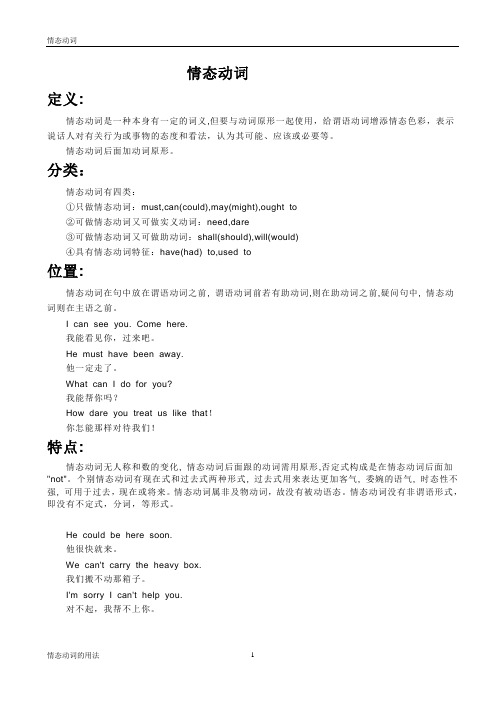
情态动词定义:情态动词是一种本身有一定的词义,但要与动词原形一起使用,给谓语动词增添情态色彩,表示说话人对有关行为或事物的态度和看法,认为其可能、应该或必要等。
情态动词后面加动词原形。
分类:情态动词有四类:①只做情态动词:must,can(could),may(might),ought to②可做情态动词又可做实义动词:need,dare③可做情态动词又可做助动词:shall(should),will(would)④具有情态动词特征:have(had) to,used to位置:情态动词在句中放在谓语动词之前, 谓语动词前若有助动词,则在助动词之前,疑问句中, 情态动词则在主语之前。
I can see you. Come here.我能看见你,过来吧。
He must have been away.他一定走了。
What can I do for you?我能帮你吗?How dare you treat us like that!你怎能那样对待我们!特点:情态动词无人称和数的变化, 情态动词后面跟的动词需用原形,否定式构成是在情态动词后面加"not"。
个别情态动词有现在式和过去式两种形式, 过去式用来表达更加客气, 委婉的语气, 时态性不强, 可用于过去,现在或将来。
情态动词属非及物动词,故没有被动语态。
情态动词没有非谓语形式,即没有不定式,分词,等形式。
He could be here soon.他很快就来。
We can't carry the heavy box.我们搬不动那箱子。
I'm sorry I can't help you.对不起,我帮不上你。
基本助动词与情态助动词最主要的区别之一是,基本助动词本身没有词义,而情态助动词则有自己的词义,能表示说话人对有关动作或状态的看法,或表示主观设想:What have you been doing since? (构成完成进行体,本身无词义)I am afraid I must be going. (一定要)You may have read some account of the matter. (或许已经)除此之外,情态助动词还有如下词法和句法特征:1)除ought和used以外,其他情态动词后面只能接不带to的不定式。
初中九年级英语常用语法知识——情态动词知识点总结(含答案)
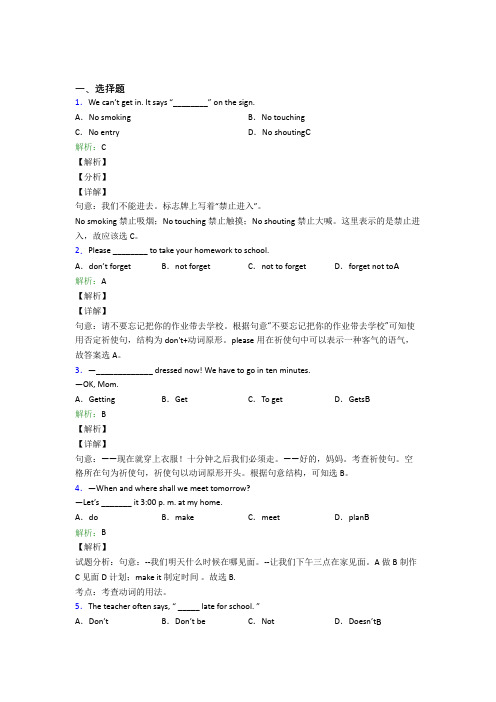
一、选择题1.We can’t get in. It says “________” on the sign.A.No smoking B.No touchingC.No entry D.No shouting C解析:C【解析】【分析】【详解】句意:我们不能进去。
标志牌上写着“禁止进入”。
No smoking 禁止吸烟;No touching禁止触摸;No shouting禁止大喊。
这里表示的是禁止进入,故应该选C。
2.Please ________ to take your homework to school.A.don’t forget B.not forget C.not to forget D.forget not to A解析:A【解析】【详解】句意:请不要忘记把你的作业带去学校。
根据句意“不要忘记把你的作业带去学校”可知使用否定祈使句,结构为don't+动词原形。
please用在祈使句中可以表示一种客气的语气,故答案选A。
3.—_____________ dressed now! We have to go in ten minutes.—OK, Mom.A.Getting B.Get C.To get D.Gets B解析:B【解析】【详解】句意:——现在就穿上衣服!十分钟之后我们必须走。
——好的,妈妈。
考查祈使句。
空格所在句为祈使句,祈使句以动词原形开头。
根据句意结构,可知选B。
4.—When and where shall we meet tomorrow?—Let’s _______ it 3:00 p. m. at my home.A.do B.make C.meet D.plan B解析:B【解析】试题分析:句意:--我们明天什么时候在哪见面。
--让我们下午三点在家见面。
A做 B制作C见面 D计划;make it 制定时间。
故选B.考点:考查动词的用法。
5.The teacher often says, “ _____ late for school. ”A.Don’t B.Don’t be C.Not D.Doesn’t B【解析】【详解】句意:老师经常说:“上学不要迟到。
高中英语Unit9情态动词I语法考点超级归纳素材

Unit9 情态动词 I语法考点超级归纳考点一:情态动词的基本用法1. 情态动词的概念情态动词又称为情态助动词(Modal Auxiliary)。
它具有词汇意义,但意义不够完整,因此一般不能单独作谓语。
情态动词表示说话人的语气和态度。
2. 情态动词的特征情态动词具有以下五个特征:(1)情态动词后面一般接原形动词(即不带to的不定式);(2)情态动词没有人称和数的变化;(3)情态动词与其他动词构成谓语时总是放在其他动词之前;(4)情态动词无非谓语形式,即没有不定式、动名词和分词形式;(5)情态动词只有现在式和过去式两种形式,但可以表示现在时间、过去时间和将来时间。
3. 情态动词的意义常见的情态动词如下表所示:现代英语语法还将have to, used to, had better, would rather, be going to, be about to等也都列为情态动词。
考点二:表示“能力”的情态动词考点三:表示“允许”的情态动词注:注意:as well 在口语中常与may或might连用,作“也好,也行”或“倒不如”解,用来缓和语气。
例如:You may as well go. 你去也好。
The weather was so bad that we might(just)as well have stayed at home. 天气太糟糕,早知道如此,倒不如呆在家里为好。
考点四:表示“推测”的情态动词gate just a moment ago.h.考点五:“情态动词+have+过去分词”表示“过去推测”“can/could/may/must+have+过去分词”表示对过去情况的推测hat注意:could, might表示推测时不表示时态,其推测的程度不如can, may。
考点六:表示“应该”的情态动词注:考点七:表示“意愿”的情态动词wil考点八:“情态动词+have+过去分词”表示“责备”“情态动词+have+过去分词”表示已经完成的动作或存在的状态,并带有感情色彩。
9.情态动词-Modal Verbs
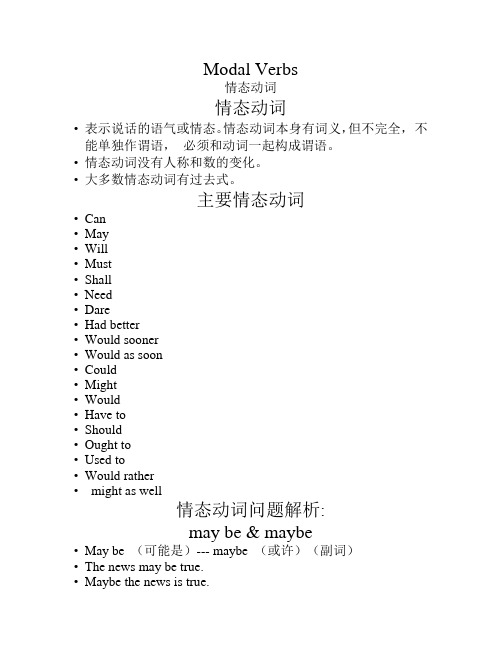
Modal Verbs情态动词情态动词•表示说话的语气或情态。
情态动词本身有词义,但不完全,不能单独作谓语,必须和动词一起构成谓语。
•情态动词没有人称和数的变化。
•大多数情态动词有过去式。
主要情态动词•Can•May•Will•Must•Shall•Need•Dare•Had better•Would sooner•Would as soon•Could•Might•Would•Have to•Should•Ought to•Used to•Would rather•might as well情态动词问题解析:may be & maybe•May be (可能是)--- maybe (或许)(副词)•The news may be true.•Maybe the news is true.•She may be waiting for you at home.•Maybe she is waiting for you at home.May not & can notmay not 译为“可能不”、“也许不会”而非“不可以”。
“不可以”为must not或can…t(不许,不可以)。
---May I smoke here?---No, you mustn‟t. /you can‟t /you can not.The news may not be true.You mustn‟t move any of the papers on the desk.Can & be able to•Be able to 可以表示更多的时态。
•We will be able to finish the work tomorrow.•He was not able to realize his greatest ambition.•Are you able to design a new computer program?•She has not been able to work out the complex problem.ought to的否定式•ought to的否定式是ought not to,疑问句只把ought提前。
高三年级英语(外研版)总复习语法课件_专项语法突破(9)情态动词与虚拟语气

have done
常用在否定句和疑问 ② Can
he
have
gone
句中。
to his uncle's?
必修5
专项语法突破(九)
高考英语总复习
情态动词 +完成式
用法
例句
可用于肯定句中,表示 外 研
对过去没有实现的事 You could have done 版 could 情的遗憾或责备,意为 better, but you were have done
和 wish 等后的宾语从句的谓语动词形式;
(3)It's time 和 would rather 后从句的谓语动词形式。
必修5
专项语法突破(九)
高考英语总复习
4.解答情态动词和虚拟语气这类题目时,一定要细细
领会情景特征,情景中没有废话,不要放过任何细节。只 外
研
有这样,才会找到足够的有效信息,做出最佳选择。
版
(not)
在否定句中表示“可能 ② He may not have
have done 不”,不用于疑问句中。finished the work.
用 might 则表示语气更 ③ She might have
加不肯定。
caught a cold.
必修5
专项语法突破(九)
高考英语总复习
情态动词 +完成式
外 研
版
情态动词 can 可用于肯定句中表示客观的(理论的)可能性,
也可以表示“一时或暂时的”情况,而表示具体事情实际
发生的可能性时,can 一般不用于肯定句中。如:
必修5
专项语法突破(九)
高考英语总复习
Accidents can happen on such rainy days.
情态动词包括情态动词的基本用法及其推测含义,虚拟语气

情态动词的用法情态动词有 can 〔could 〕, may 〔might 〕, must, have to, shall 〔should 〕, will 〔would 〕, dare 〔daren ' t,dared 〕, need 〔needn ' t,needed 〕, oughho,慵曲知司无人称和数的变化;不能 单独使用,必须与其后的动词原形构成谓语.可以有推测意义,也可以没有推测意义. 不同的 肯定"程度可按以下层次排列: 1.He is at home.〔事实〕3.He could be at home.〔很可能〕 5.He may be at home.〔仅仅可能而已〕 7.He might not be at home.〔也许不在家〕9.He couldn ' t be at hom 很可能不在家〕 一、can, could ⑴.can 的用法 1. 水平〔能做某事 〕: Two eyes can see more than one. 2. 表示客观可能性〔客观原因形成的水平〕〔可以,可能〕. 1〕 They ' ve changed the timetable, so we can go by bus instead. 2〕 This hall can hold 500 people at least.3.一时的可能性〔有时可能〕Children can be very trying 〔令人厌烦的;难受的〕.4. 同意、允许〔可以〕Can I come in?在这里can 和may 的意思差不多.口语中用 can 更多.5. 用于疑问句和否认句中,表示惊讶、不相信等〔可能 ,能够〕 1〕 What can he mean? 他能够是什么意思呢? 2〕He can ' t be more than thirt他不可能在三十以上. 后面有时跟完成形式或进行形式1〕 You can ' t have forgotten me不可能已经忘记我了.2〕If he said that, he can' t be telling the 曲u椎说,他讲的不可能是真话.3〕 What on earth can he be doing?他此刻能在干什么呢? ⑵.could 的用法 1. 作为can 的过去式,表示过去情况:a. 水平: Lanny could run and was a good tennis player. 这时可以用 was/were able to 表示同样的意思:b. 可能性〔可以,可能〕: 1〕 It was so dark we could see nothing. 2. 用来代替can,说明现在的情况 a. 婉转地提出请求、想法等:1〕 Could I borrow your book? 3〕 I couldn ' t be happe.能再快乐了. b. 用于疑问句及否认句,表示惊异、不相信等 1〕 C ould this be true? 2〕 T he money has disappeared. Who could have taken it? 3〕 S urely nothing could be going on there so late at night. 3.could+完成形式可用来谈过去情况: a.表示那时“〔不〕可能〞,代表can 的过去式:1〕 She couldn ' t have been moresthaeen at that time.2〕We could not have heard them because of the noise from the river.2.He must be at home.〔非常肯定的推断〕 4.He ought to be at home.〔很可能〕 6.He might be at home.〔或许,非常不确定〕 8.He may not be at home.〔比 might 可能〕 10.He can ' t be at homer定不在家〕2〕 He said he couldn't come.2〕 I could come early, if necessary.〔推测性用法〕:b.表示那时本来可以〞、差点就要〞等:1)I could have lent you the money. Why didn ' t you ask me?2)Her husband could have told her, but he did not choose to.(3).与其他情态动词的比拟1)Can you lift this heavy box? 2) He was able to (could) run very fast.a.表示水平,此时可用be able to代替.She wasn ' t able to (couldn ' t) answer the question.b.Can只有一般现在时和一般过去式;而be able to那么有更多的时态.I ' ll not be able to come this afternoon.c.当表示经过努力才得以做成功某事"时应用be able to, was / were able to :设法做成某事" 相当于managed to do sth. succeeded in doing sth.不能用Can. 如:He was able to go to the party yesterday evening in spite of the heavy rain.d.表示请求和允许时可与may互换.---Can I go now? --- Yes, you can. / No, you can ' t.e.在疑问句中还可用could, might代替,不是过去式,只是语气更委婉,不能用于肯定句和答语中.---Could I come to see you tomorrow? --- Yes, you can. ( No, I ' m afraid not.)1) A computer think for itself; it must be told what to do. AA. can ' tB. couldn ' tC. may notD. might not2)The fire spread through the hotel very quickly but everyone get out. DA. had toB. wouldC. couldD. was able to3)They will run this machine on their own in three months. DA. canB. couldC. mayD. be able to4)That big cinema seat 2,000 people. AA. canB. shouldC. ought toD. is able to二、may, might(1).may的用法1.表示允许":1) May I have a word with you? 2) You may do exactly as you like.2.用在陈述句中表示可能〞:1)It may be a new species.2) A fool may give a wise man counsel(劝告).傻子也可能给聪明人出主意.3.用在某些状语从句中:1)Write to him at once, so that he may know in time.2)Shut the window for fear that it may rain.4.用来表示祝愿1)May you enjoy many years of health and happiness.2)May God bless you!愿上帝赐福于你!5.用于may as well,意为不妨":1)Catherine, you may as well come too.2)If that is the case, I may as well try.既然如此,我不妨试一试.(2).might的用法1.用作may的过去式:a表示可以〞:1)I asked her if I might call and see her. 2) I thought you might stay with us.b.表示可能〞:1)He thought it might be wise to try his luck there.2)It was careful not to look at him. He might have seen the surprise in my eyes.c.用在某些状语从句中:He died so that others might live.2.用来代替may,谈现在的情况,口气比may更婉转些.a.表示可以〞:1)Might I borrow your umbrella? 2) I wonder if I might use your phone.b.表示可能〞,或许〞,比may所表达的可能性较低:1)It might be worth thinking about. 它可能值得考虑.2)I might have come to a wrong conclusion. 我可能得出了错误的结论.3)He might be expecting an answer from you. 他可能正期待这你的答复.3.用might+完成形式谈过去的情况a.或许……〞本来可以〞,表示与事实相反1)They might not have considered me as their friend.2) A lot of man died who might have been saved.b.用于might as well(和may as well意思相同,表示不妨")The buses are so expensive these days, you might as well get a taxi.(3).比拟may 与might1.表示请求和允许. might比may语气更委婉,而不是过去式. might, could比拟委婉,一般多用于疑问句.can, may表达的语言比拟随便.否认答复时可用can'或mustn' ,t表示不可以,禁止〞.1)----Might/ May I smoke in this room? ---- No, you mustn ' t.2)---- May/Might I take this book out of the room? ---- Yes, you can. (No, you can ' t / mustn ' t.)用May I... ?征徇对方许可时比拟正式和客气,而用Can I...?在口语中更常见.2.may可用于祈使句,表示祝愿.1) May you succeed!3.表示推测、可能性(不用于疑问句). might不是过去式,它所表示的可能性比may小.1)He may /might be very busy now.2)Your mother may /might not know the truth.3)— Could I borrow your dictionary? — Yes, of course you. CA. mightB. willC. canD. should4)— Might I watch TV after supper? — Yes, you. AA. mayB. mustC. mightD. can三、must, have to(1).must的用法1.表示必须〞、'定要〞、得〞(多指现在或将来情况):1)We must call the doctor. 2) I ' m afraid I must be going.2.mustn '表示』定不要":1)Of course she mustn ' t leave us2 ) You mustn ' t walk on the grass.3.表示愉要〞,偏偏〞(做或发生不愉快的事)1)After I gave her my advice, she must go and do the opposite.2)Why must she be so angry with me? 为什么她偏偏对我生气?4.must表示推测、可能性(多用于肯定的陈述句)Judging by the smell, the food must be good.后面可跟完成形式或进行形式:1)The article must have been written by a woman.2)He must be working very hard.(2).与其他情态动词的比拟1.must表示必须、必要,在答复引出的问句时,如果是否认的,不用mustn '箴止,不准),而用needn' t, don 't hav^tO().---Must we hand in our exercise books today? --- Yes, you must. ---No, you don ' t have to / you needn,t.2.must是说话人的主观看法,而have to那么强调客观需要.Must只有一般现在时,have to有更多的时态形式.1)His play isn ' t interesting, I really must go now.2)I had to work when I was your age.四、dare, need(1).need的用法1.need用作情态动词主要用于否认句和疑问句中,表示不必〞1)You needn ' t clean the windows. They aren ' t dirty.2)It needn ' t be talked abou必谈到它.3)Need you have paid so much? 你必须付这么多钱吗?4)Do you think you need tell her about it?2.need 的虚拟用法:needn ' t have do^^必"';needn ' t be doin/不必'〞1)You needn ' t have bought 你本不必买它的.2)You needn ' t be standing here in the raii^本不必站在这儿的雨中.⑵.dare的用法1.作情态动词时表示敢 ... "但可有过去式dared,主要用于否认句和疑问句:1)He daren ' t ask his boss for a day.他不敢向老板请一天假.2)No one dared speak of it.3)How dare you ask me such a question? 你怎么敢问我这样的问题.4)Dare you do it? --- I daren ' t do it.2.用于I dare say (我猜想,或许,可能)I dare say he will say. 或许他会说的.(3).dare 和need 异同:1.dare和need当情态动词用时:a.无人称和数的变化;b.后接动词原形,尤其用于否认句及疑问句中;可用在if/whether之后;或与hardly, never, no one, nobody 连用;c.常以needn '和daren '的形式出现;;d.dare有其过去式dared.1)If we dared not go there that day, we c ouldn ' t get the beautiful flowers.2)I daren ' t ask her for a rise不敢请求她加薪.3)How did you dare to tell her that?4)I wonder whether he dare stand up in public.5)I wonder whether he need send it immediately.6)I need hardly tell you that the work is dangerous. 我几乎不必告诉你这个工作是危险的.7)You needn ' t finish that work today.2.当实义动词用时多用于肯定句,有人称、时态和数的变化.在肯定句中, dare后面常接带to的不定式.在疑问句和否认句中, dare后面可接带to或不带to的不定式.而need后面只能接带to 的不定式. (sb.) need to do; dare to do; (sth.) need to be done; (sth.) need doing1)I don ' t krioo w she dares to wear that dress.我不知道她怎么敢穿那件长裙.2)He doesn ' t dare (to) answer.3)He needs to finish his homework today. 他今天需要完成他的家庭作业.4)Do you need any help?5)The garden doesn ' t need watering at the moment.五、shall, should(1).shall的用法1.shall表威胁、警告、命令、承诺,用于第二、第三人称.1)He shall be punished if he disobeys. 他假设不服从就要受到惩罚.2)You shall have my answer tomorrow. 你明天可以得到我的答复.3)She shall get her share. 她可以得到她的一份.2.表征询意见,用于第一、第三人称,并用于疑问句.1)Shall I get you some fresh coffee, Linda? 琳达,我给你取些新鲜的咖啡好吗?2)What shall we do this evening? Shall we go to the theatre?今晚我们干什么?去看戏好吗?⑵.should的用法1.表义务,可用于各种句式,通常指将来或现在.1)You should do what your parents tell you. 你应该干你的家长告诉你的事.2)He should do some work, but he doesn '他wan^fo些活,但他不想干.3)You shouldn ' t feel so unhappy over such trifles这种小事,你不应该感到这么不快乐.4)You shouldn ' t be sitting in the su你不应该坐在阳光下.2.用于第一人称问句,表征询意见.Should I open the window?3.表感情色彩,意为竟然1)Why shouldn ' t you invite him2)I don ' t see why we shouldn e friend s?a咸不明白为什么我们竟不能成为朋友?4.should的虚拟和推测用法a表推测, 按理应该〞.1)The film should be very good as it is starring first-class actors.2)I should know her among a thousand.b.表虚拟, 本来应该〞或应该〞.1)He looks very ill. He should have stayed at home.2)I suggest that you should stay here as if nothing had happened.3)If he should drop in, give him my message.六、will, would(1).will的用法1.表意愿,主要用于第一人称. would指过去将来1) I won ' t argue with you. 2) I said I would do anything for him.2.表拒绝,用于否认句.would指过去将来.1)The doctor knows I won ' t be operated如®道我不想做手术.如主语是物,那么意为不起作用〞.2)The drawer won 't (wouldn ' sth ut.抽屉关不上了.3)My fountain pen wouldn't write. 我的自来水笔不能写字了.3.表请求,指将来,用于疑问句. would更客气1)Will you dine with me tomorrow? 明天同我一道吃饭好吗?2)Would you mind closing the door? 你介意关门吗?4.表猜想,指现在或将来;用于进行式时指现在;用于完成式时指过去,用于二、三人称.1)This will be the school, I believe.2)They will be waiting. 他们一定在等我们.3)You will have heard the news, I 我想m 如re听到了这个消息.5.有时will表难免.1) Boys will be boys.男孩子毕竟是男孩子. 2) Accident will happen.事故难免发生.⑵.would的用法1.表过去习惯性的动作:1)Occasionally they would go out and paint pictures. 偶尔他们会出去画画.2)Now and then a black bird would call. 偶然黑鸟会叫几下.2.表示对过去事情的推测, 大概;想必是〞:1)That would be in 1976, I think. 我想那大概是在1976 年.2)The person you mentioned would be his father, is that right? 你说的那个人想必是他的爸爸了,对吗?3.would用于虚拟条件句与含蓄条件句a.用于虚拟条件句:1)I would do it if I could.2)She would have talked more, had he not walked away.如果他没走开,她会谈得更多.b.用于含蓄条件句;1)Anybody else would have believed you. 任何别人都会相信你的话.2)But for your help we would have been late. 要不是你的帮助,我们就退到了.3)Such a thing wouldn ' t have happened elsewh^r事在别处是不会发生.(3).will, would, used to 的比拟1.表示请求、建议等, would 更委婉.Will / Would you pass me the ball, please?2.都可表示意志、愿望和决心.1) I will never do that again. 2) They asked him if he would go abroad.3.也都可以表猜想之意,但would语气更弱.1) This will be the school, I believe. 2) That would be in 1976, I think.4.would表示过去反复发生的动作或某种倾向. would表示过去习惯时比used to正式,usedto过去常常,现已无此习惯.1)During the vacation, he would visit me every other day.2)The wound would not heal.(4).shall 与will 的比拟shall / will+动词原形:均可表示将来. 过去时为should, would oshall可表示征询意见或命令、警告、允诺或威胁. will可表示意愿、常出现的动作、在疑问句中表示请求和建议.七、should, ought to(1).ought to 的用法1.应该应当(意思接近should)1) There is one thing I ought to tell you. 2) He ought not to do that.3)--- Ought he to go? ---Yes, he ought to. 4) Something ought to be done about it.2.表虚拟1)I ought to have helped her, but I never could.我本该帮她,但没能够.2)They oughtn ' t to have let you out of hospital so sool.本该帮她,但没能够.3.ought的推测用法1)I ought to be able to live on my salary. 我应当能靠薪水生活.2)I ought to be fit for the work next month. 下个月我应该可以工作了.后面可以跟完成形式或进行形式:1)He ought to have arrived by now. 他到现在应该已经到了.2)We ought to be hearing from him soon. 我们应该很快收到他的来信.(2).ought to与其他情态动词的比拟1.should, ought t.表示应该",ought t.表示义务或责任,比should语气重.1)I should help her because she is in trouble.2)You ought to take care of the baby.2.表示劝告、建议和命令. should, ought to可通用,但在疑问句中常用should o1)You should / ought to go to class right away.2)Should I open the window?3.表示推测should , ought to (客观推测),must(主观推测).1)He must be home by now.(断定他已到家)2)He ought to/should be home by now.(不太肯定)3)This is where the oil must be.(直爽)4)This is where the oil ought to/should be.(含蓄)八、表示否认的情态动词的用法:局部情态动词的否认式是情态动词中的考点之一. mustn'不准,禁止;needn'没必要(=don ' t have to;)can '不能;不可能;may not 不可以;可能不;shouldn '不应该(=ought not to )1)You return the book now. You can keep it till next week if you like. CA. can ' tB. mustn ' tC. needn ' tD. may not2)Johnny, you play with the knife, you hurt yourself. BA. won ' t ; canB. mustn ' t ; mayC. shouldn ' t ; muDt can ' t ; shouldn ' t3)--- Will you stay for lunch? --- Sorry,. My brother is coming to see me. BA. I mustn ' tB. I can ' tC. I needn ' tD. I won ' t4)---May I pick a flower in the garden? ---. CA. No, you neednB. tNot, please.C. No, you mustnD.tNo, you won ' t九、情态动词短语的使用:would like to do 愿•意干•••.;would rather do •宁愿•••.;wouldrather + 从句;would prefer to do...更喜欢干•••.;had better do...最好干…..纠正错误:1)Would you like having some tea? Would you like to have some tea?2)I ' d prefer going to the lecture this evening. I ' d prefer to go to ...3)I ' d rather you to go to the meeting. ••- you went to ...4)He would rather to die than to give in. He would rather die than give in.5)You ' d better to have your hair cut today. You' d etter have ...十、情态动词+不定式完成式(have done)情态动词现在完成式主要有两个功能:表示已经发生的情况和表示虚拟语气.在这两个方面must/mustn ' ,t; can/cannneed/needn'; tmay/mayri & might/mightn should/shouldn t ougtht to等情态动词+完成式表示的意思是有一定区别的(1) can + have done在疑问句或否认句中表示"过去可能会做/不可能做了(表推测)".could/couldn 't have done 1.过去可能/不可能做(表推测)2.过去本来能够做/没能够做(表虚拟)1.You could have done better, but you didn ' t try^youTbest.2.He can ' t have been to that tow推测)3.Can he have got the book?(推测)4.Mary my letter; otherwise she would have replied before now.A. couldn ' t have receivedB. ought to have receivedC. has receivedD. shouldn ' t have received (答案为A)(2) may / might + 不定式完成式 ( have done)表示对过去行为的推测时, 不用于疑问句,might所表示的可能性比may小.might havedone还可表示“过去本可能做(表虚拟广,多用于肯定句.1). He may not have finished the work . 他可能没完成工作.2). If we had taken the other road, we might have arrived earlier.如果我们取另一条道,我们可能到得更早.⑶must +不定式完成式(have done)用于肯定句中,表示对过去行为的推测.意为「定、想必〞.其疑问、否认形式用can, can '代替.参看(1) can / could + have done 表示推测.1). You must have seen the film Titanic.2). He must have been to Shanghai.3). My pain apparent the moment I walked into the room, for the first man I met askedsympathetically, " Are you feeling al P rightA. must beB. had beenC. must have beenD. had to be (答案为C)(4)should + 不定式完成式(have done)用于肯定句中,表示对过去行为的推测.He should have finished the work by now .表示本应该做而实际上没有做某事〞,其否认式表示某种行为本不该发生却发生了.可以与ought to +不定式完成式(have done)互换.1). You ought to / should have helped him. (but you didn ' t.)2). She shouldn ' t have taken away my measuring tape, for I wanted to use it.她不该拿走我的卷尺,由于我想用它.(5)needn '不定式完成式(have done)表示本来不必做而实际上做了某事".1). You needn ' t have watered the flowers, for it is going to rain.2). As it turned out to be a small house party, we so formally.A. needn ' t dress upB. did not need have dressed upC. did not need dress upD. needn ' t have dressed up(没有必要穿的那么正式,表达是说话者的建议,实际结果是否真的穿的很正式没有确定, 答案为D) (6)will +不定式完成式(have done)主要用于第二、三人称,表示对已完成的动作或事态的推测. He will have arrived by now.would+have+done表示对过去事情的假设,意思是"本来会做" (表虚拟).1)I would have told you all about the boy's story, but you didn't ask me. 我本来会告诉你这个小男孩的故事,但是你没有问我.2)Without your help, I wouldn't have achieved so much. 没有你的帮助,我是不会取得如此大的成绩.⑺would rather (not) have done宁愿当时(没)做(表虚拟),有"懊悔〞之意.I raised objections at the meeting, but now I would rather not have done that.我在会上提出了反对意见,但现在我宁愿没那么做.(8) would like/love to have done 过去愿意做而未做成 (表虚拟)I would love to have gone to the party last night, but I have to work extra hours to finish a report.昨晚我本来很想去参加聚会的,但我得加班完成一个报告.十一、几个情态动词常考的句型:1.may/might (just) as well 不妨,最好",与had better 相近;Since the flight was cancelled, you might as well go by train.既然航班已经取消了,你不妨乘火车吧.相当于you had better go by train.2.cannot / can' t…too越••••"•••越好,怎么也不过分".注意这个句型的变体cannot ••• over •••.1)You cannot be too careful when you drive a car. 驾车时候,越小心越好.2)The final chapter covers organizational change and development. This subject cannot beover emphasized .最后一章涵盖了组织变革和开展.这个话题再怎么强调也不为过.edn'或did ' t use 的used to (do)的否认式.4.should除了应该〞,还要掌握其竟然〞的意思.I didn ' t expect that he should have behaved like th我无法想象他竟然这样做.情态动词练习题:1.At this moment, our teacher must be marking our exam papers.这时,我们老师想必在批改试卷.2.The road is wet. It must have rained last night.(rain)3.Your mother must have been looking for you. 你妈妈一定一直在找你.4.Philip may (might) have been hurt seriously in the car accident.菲利普可能在车祸中受了重伤.5.---Linda has gone to work, but her bicycle is still here.---She may (might) have gone (go) by bus.6.Mike can ' t have found his car, for he came to work by bus this morning.迈克一定还没有找回他的车,由于早上他是坐公共汽车来上班的.7.He shall be punished if he disobeys.如果他不服从,就要受到惩罚.8.We are not going to quarrel at all if you will only let me speak.只要你让我说话,我们根本就不会吵架.9.--Sir,he go or stay? --Let him go. BA. willB. shallC. mightD. could10.The door won't open.这门经常打不开.11.Ronald stay in his small garden for a long time every day in the past. DA. couldB. mightC. shouldD. would12.You shall have the book after I read it.我看完以后一定把这本书给你^13.Put on more clothes. You be feeling cold with only a shirt on. CA. canB. couldC. mustD. would14.--- Must I drive to his house and pick up the children? ---No,. CA. you shouldn'tB. you might notC. you needn'tD. you mustn't15.We didn't see Tom at the meeting yesterday. He it. BA. mustn't have attendedB. cannot have attendedC. needn't have attendedD. would have not attended16.We play chess than bridge. Some of us don't know how to play bridge. AA. had betterB. would betterC. would ratherD. had rather17.There is someone knocking at the door.it be Tom? AA. canB. mustC. shouldD. ought to18.Two year ago, my husband bought me a bicycle. If you live in town, it is often faster than a car and you worry about parking. DA. must notB. may notC. should notD. don't have to19.--Is John coming by train? D--He should, but he not. He likes driving his car. 〔2002 高考题〕A. mustB. canC. needD. may20.It has been announced that candidates〔候选人〕remain in their seats until all the papers have been collected. D〔2002 上海高考题〕A. canB.willC. mayD. shall21.---I heard they went skiing in the mountains last winter. 〔2002 北京高考题〕 C---It true because there was little snow there.A. may not beB. won ' t beC. couldn ' t beD. mustn ' t be22. A sense of anxiety if we were addicted to various social networking〔人际网,联网〕applications. DA.would have arisenB.has arisenC.will ariseD.could arisearise vi.〔问题或困境〕出现,发生;起床;起立;起身;奋起斗争arise from/ out of由........ 引起/23.The guide was enthusiastic and knowledgeable and we spent a lovely evening wandering into places which we straight past otherwise. CA.had walkedB.were walkingC.would have walkedD.must have walked24.---Mr. Frank Smith truly stands out as the best friend and teacher combination.---Absolutely! When I look back on what he did, I'm not sure whether I the same in his position. BA.would doB.would have doneC.must have doneD.could do25.---I would be greatly thankful to Jason Coates who rescued my life after I fell through the ice. C---That's it. You Christina, your wife but that〔要不是〕Jason pulled you from the canal.A.will never meetB.would never meetC.would never have metD.will never have met26.The desk that clean so I could do home-work was always surrounded with bowls ofbad milk, old magazines and so on. DA.may have beenB.would have beenC.must have beenD.should have been27.---Did you attend the meeting for the experi-ment project yesterday? A---Yes, but I don't think I because my director was there.A.need haveB.needed toC.need to haveD.need to28.We can gain valuable wisdom from mistakes which to prevent them from happening again. DA.should be avoidedB.might be avoidedC.must have been avoidedD.could have been avoided。
情态动词知识点大总结
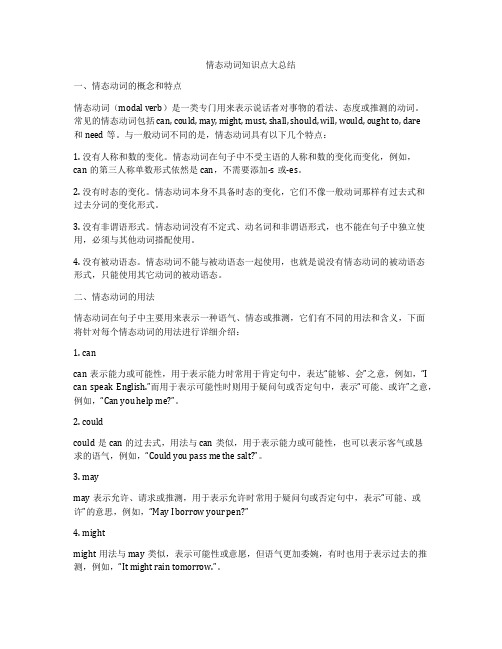
情态动词知识点大总结一、情态动词的概念和特点情态动词(modal verb)是一类专门用来表示说话者对事物的看法、态度或推测的动词。
常见的情态动词包括 can, could, may, might, must, shall, should, will, would, ought to, dare和need等。
与一般动词不同的是,情态动词具有以下几个特点:1. 没有人称和数的变化。
情态动词在句子中不受主语的人称和数的变化而变化,例如,can的第三人称单数形式依然是can,不需要添加-s或-es。
2. 没有时态的变化。
情态动词本身不具备时态的变化,它们不像一般动词那样有过去式和过去分词的变化形式。
3. 没有非谓语形式。
情态动词没有不定式、动名词和非谓语形式,也不能在句子中独立使用,必须与其他动词搭配使用。
4. 没有被动语态。
情态动词不能与被动语态一起使用,也就是说没有情态动词的被动语态形式,只能使用其它动词的被动语态。
二、情态动词的用法情态动词在句子中主要用来表示一种语气、情态或推测,它们有不同的用法和含义,下面将针对每个情态动词的用法进行详细介绍:1. cancan表示能力或可能性,用于表示能力时常用于肯定句中,表达“能够、会”之意,例如,“I can speak English.”而用于表示可能性时则用于疑问句或否定句中,表示“可能、或许”之意,例如,“Can you help me?”。
2. couldcould是can的过去式,用法与can类似,用于表示能力或可能性,也可以表示客气或恳求的语气,例如,“Could you pass me the salt?”。
3. maymay表示允许、请求或推测,用于表示允许时常用于疑问句或否定句中,表示“可能、或许”的意思,例如,“May I borrow your pen?”4. mightmight用法与may类似,表示可能性或意愿,但语气更加委婉,有时也用于表示过去的推测,例如,“It might rain tomorrow.”。
英语语法:“情态动词+完成式”的用法
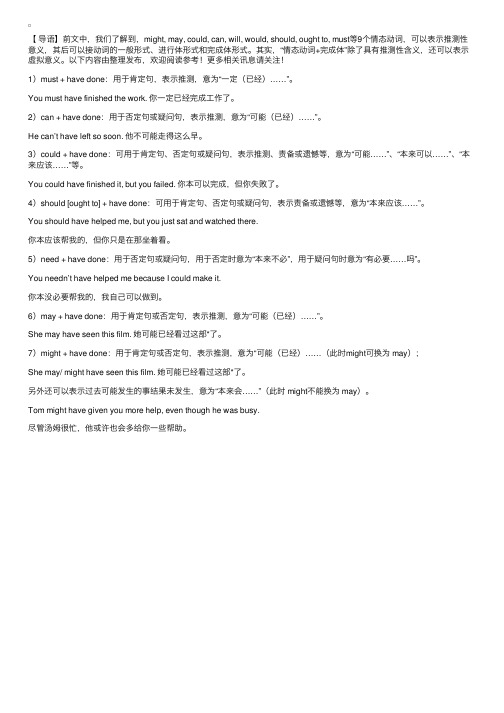
【导语】前⽂中,我们了解到,might, may, could, can, will, would, should, ought to, must等9个情态动词,可以表⽰推测性意义,其后可以接动词的⼀般形式、进⾏体形式和完成体形式。
其实,“情态动词+完成体”除了具有推测性含义,还可以表⽰虚拟意义。
以下内容由整理发布,欢迎阅读参考!更多相关讯息请关注!1)must + have done:⽤于肯定句,表⽰推测,意为“⼀定(已经)……”。
You must have finished the work. 你⼀定已经完成⼯作了。
2)can + have done:⽤于否定句或疑问句,表⽰推测,意为“可能(已经)……”。
He can’t have left so soon. 他不可能⾛得这么早。
3)could + have done:可⽤于肯定句、否定句或疑问句,表⽰推测、责备或遗憾等,意为“可能……”、“本来可以……”、“本来应该……”等。
You could have finished it, but you failed. 你本可以完成,但你失败了。
4)should [ought to] + have done:可⽤于肯定句、否定句或疑问句,表⽰责备或遗憾等,意为“本来应该……”。
You should have helped me, but you just sat and watched there.你本应该帮我的,但你只是在那坐着看。
5)need + have done:⽤于否定句或疑问句,⽤于否定时意为“本来不必”,⽤于疑问句时意为“有必要……吗”。
You needn’t have helped me because I could make it.你本没必要帮我的,我⾃⼰可以做到。
6)may + have done:⽤于肯定句或否定句,表⽰推测,意为“可能(已经)……”。
She may have seen this film. 她可能已经看过这部*了。
常见的情态动词有

常见的情态动词有情态动词是英语中重要的词类之一,它们强调了说话者对某种态度、情感或推测的表达。
在英语中,一共有十种情态动词,它们分别是 can、could、may、might、shall、should、will、would、must 和 ought to。
下面将分别介绍这十种情态动词的基本用法和常见表达方式。
1. cancan 是情态动词中最常用的一种,用于表示“能力”、“许可”或“可能性”等含义。
例如:- I can speak Chinese fluently.(我说中文说得很流利。
)- Can I borrow your pen for a moment?(我能否借一下你的笔?)- It can be difficult to understand Shakespeare.(理解莎士比亚可能会很困难。
)can 的否定形式是can’t,表示“不能”或“不可能”。
例如:- I can’t run very fast.(我跑不太快。
)- This can’t be true.(这不可能是真的。
)2. couldcould 是 can 的过去式,也可以表示“能力”、“许可”或“可能性”。
它比 can 更委婉,常用于礼貌性的请求、建议或询问。
例如:- Could you please pass me the salt?(你能把盐递给我吗?)- I think we could try to finish this project by next week.(我想我们下周会试着完成这个项目。
)- It could rain later, so take an umbrella just in case.(天气可能会下雨,所以带把伞以防万一。
)could 的否定形式是couldn’t,表示“不能”或“不可能”。
例如:- I couldn’t understand what he was saying.(我听不懂他在说什么。
英语情态动词详解

can / could的用法
3. 表示推测, 含惊讶、怀疑的语气, 只用在疑问、 否定、感叹句中。
----It’s so late. Can Tom be reading? (疑问) ----It can’t be Mary. She has fallen ill. (否定) ----How can you be so careless! (感叹)
can / could的用法
4. cannot too译为“无论怎样…也不为过; 越…越 好”。
----You cannot be too careful while driving a car on such a dark night.
may / might的用法
1. 表示许可。 = be allowed to do ----You may go now. ----May/Might I dance with you? 回答: Yes, you may/can. No, you mustn’t.
must 的用法
与have to的区别: ③否定意义不同 mustn’t表示禁止, 译为“不准”、“不允许”。 don’t have to译为“不必”。 ----You mustn’t smoke in the office. ----You don’t have to call back tonight.
2. should表惊讶, 惋惜, 译为“竟然”。 ----I find it astonishing that he should be so
rude to you. ----I didn’t expect that he should have
finished the job ahead of time.
2024年中考英语真题专项汇编(9)情态动词(含答案)
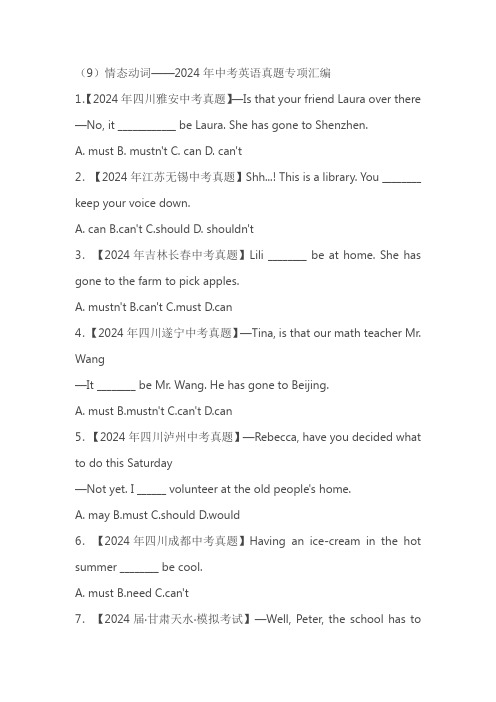
(9)情态动词——2024年中考英语真题专项汇编1.【2024年四川雅安中考真题】—Is that your friend Laura over there —No, it ____________ be Laura. She has gone to Shenzhen.A. mustB. mustn'tC. canD. can't2.【2024年江苏无锡中考真题】Shh...! This is a library. You ________ keep your voice down.A. canB.can'tC.shouldD. shouldn't3.【2024年吉林长春中考真题】Lili ________ be at home. She has gone to the farm to pick apples.A. mustn'tB.can'tC.mustD.can4.【2024年四川遂宁中考真题】—Tina, is that our math teacher Mr. Wang—It ________ be Mr. Wang. He has gone to Beijing.A. mustB.mustn'tC.can'tD.can5.【2024年四川泸州中考真题】—Rebecca, have you decided what to do this Saturday—Not yet. I ______ volunteer at the old people's home.A. mayB.mustC.shouldD.would6.【2024年四川成都中考真题】Having an ice-cream in the hot summer ________ be cool.A. mustB.needC.can't7.【2024届·甘肃天水·模拟考试】—Well, Peter, the school has tohave rules. You can't take the test because you are late.—I know, but it's not fair. They ____ let me take the test later.A. shouldB. couldn'tC. mightD. wouldn't8.【2024届·河北唐山·二模】—________ I add some sugar to it —Of course. It's up to your taste.A. MustB. ShouldC. WillD. Can9.【2024届·江苏南通·一模】—Do you know the saying “ When I walk along with two others, they ________ serve me as my teachers.”— Yes. It tells us we can learn from the people around us.A. mayB. mustC. shouldD. need10.【2024届·吉林长春·二模联考】—Sam, ________ I join you in the community service—Of course you can.A. needB. mustC. shouldD. can11.【2024届·广西钦州·一模】—Betty is absent. What's the matter with her—I'm not sure. She ________ be ill.A. mustB. mayC. has to12.【2024届·吉林吉林·二模】—The paper cutting is pretty lively. Who made it—It _________ be Mary. None of us is able to do it except her.A. canB. mustC. might13.【2024届·山东菏泽·二模】Students ______ be allowed to bring their cellphones to the classroom. What's your ideaA. shouldn'tB. couldn'tC. needn't14.【2024届·山东菏泽·二模】Jim lost this competition. He _______ be sad now. Let's go and cheer him up.A. mustB. has toC. can't15.【2024届·海南海口·一模】—I hear you have a home robot. —Yes, it's amazing. It ______ do all my housework.A. canB. mustC. should参考答案1.答案:D2.答案:C解析:句意:嘘……!这里是图书馆。
情态动词
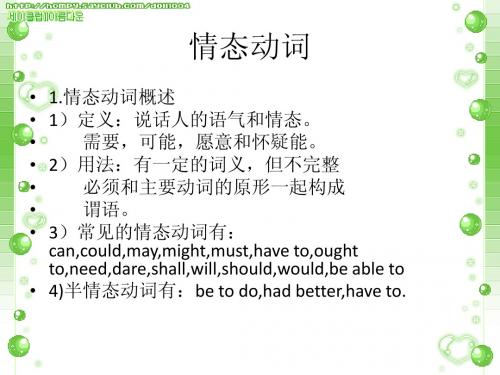
情态动词的用法
• B.could也可指未来的能力 • 在表示试探性的“能力”时,常用could,可 表示现在或将来。也可用can,只不过can的 肯定性比could强得多。 • We could try asking the teacher for help. • You should complain about what I’ve done,but I have tried my best.
情态动词的用法
• 3)表示许可 • Can/could可以用来表示“向对方请求许可”, “给予对方许可”,“陈述许可”等。 • 1>向对方请求许可。 • 不拘礼节是用can,讲礼貌时用could. • Can I...?Could I...? • 肯:Sure./Of course./Certainly./Yes,of course. • 否:No,of course not./No,you can’t. • 否(礼貌):Sorry,I am afraid I can’t.
情态动词的特征
• 3.有些情态动词有过去式,如:must;有些 有过去式,如: • Can-could may-might shall-should will-would need-needed have to-had to • 4.情态动词后接动词原形,即:不带to的不 定式(ought to,have to,used to本身带有to) • Eg:He may lose his way. • You ought to obey the rules.
情态动词的用法
• 注意: • 在虚拟语气的主句中可用could表示未来不 可能实现的情况。 • If I had more time,I could go with you tomorrow.
小学英语复习归纳9 动词之非实义动词
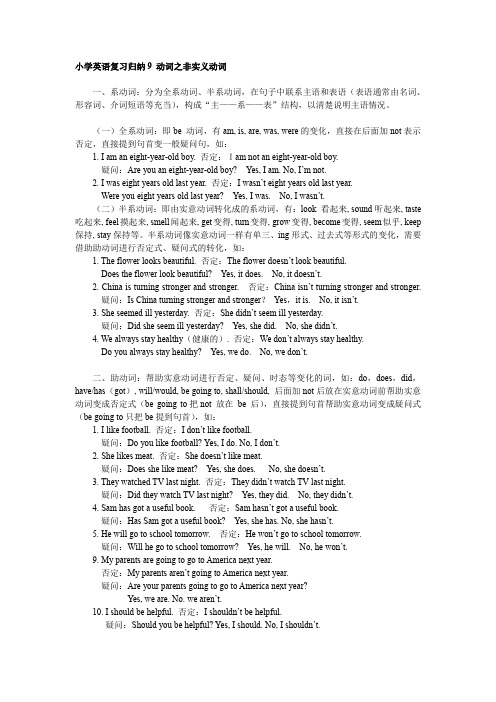
小学英语复习归纳9 动词之非实义动词一、系动词:分为全系动词、半系动词,在句子中联系主语和表语(表语通常由名词、形容词、介词短语等充当),构成“主——系——表”结构,以清楚说明主语情况。
(一)全系动词:即be 动词,有am, is, are, was, were的变化,直接在后面加not表示否定,直接提到句首变一般疑问句,如:1. I am an eight-year-old boy. 否定:Iam not an eight-year-old boy.疑问:Are you an eight-year-old boy? Yes, I am. No, I’m not.2. I was eight years old last year. 否定:I wasn’t eight years old last year.Were you eight years old last year? Yes, I was. No, I wasn’t.(二)半系动词:即由实意动词转化成的系动词,有:look 看起来, sound听起来, taste 吃起来, feel摸起来, smell闻起来, get变得, turn变得, grow变得, become变得, seem似乎, keep 保持, stay保持等。
半系动词像实意动词一样有单三、ing形式、过去式等形式的变化,需要借助助动词进行否定式、疑问式的转化,如:1. The flower looks beautiful. 否定:The flower doesn’t look beautiful.Does the flower look beautiful? Yes, it does. No, it doesn’t.2. China is turning stronger and stronger. 否定:China isn’t turning stronger and stronger.疑问:Is China turning stronger and stronger?Yes,it is. No, it isn’t.3. She seemed ill yesterday. 否定:She didn’t seem ill yesterday.疑问:Did she seem ill yesterday? Yes, she did. No, she didn’t.4. We always stay healthy(健康的). 否定:We don’t always stay healthy.Do you always stay healthy? Yes, we do. No, we don’t.二、助动词:帮助实意动词进行否定、疑问、时态等变化的词,如:do,does,did,have/has(got), will/would, be going to, shall/should, 后面加not后放在实意动词前帮助实意动词变成否定式(be going to把not 放在be 后),直接提到句首帮助实意动词变成疑问式(be going to只把be提到句首),如:1. I like football. 否定:I don’t like football.疑问:Do you like football? Yes, I do. No, I don’t.2. She likes meat. 否定:She doesn’t like meat.疑问:Does she like meat? Yes, she does. No, she doesn’t.3. They watched TV last night. 否定:They didn’t watch TV last night.疑问:Did they watch TV last night? Yes, they did. No, they didn’t.4. Sam has got a useful book. 否定:Sam hasn’t got a useful book.疑问:Has Sam got a useful book? Yes, she has. No, she hasn’t.5. He will go to school tomorrow. 否定:He won’t go to school tomorrow.疑问:Will he go to school tomorrow? Yes, he will. No, he won’t.9. My parents are going to go to America next year.否定:My parents aren’t going to America next year.疑问:Are your parents going to go to America next year?Yes, we are. No. we aren’t.10. I should be helpful. 否定:I shouldn’t be helpful.疑问:Should you be helpful? Yes, I should. No, I shouldn’t.三、情态动词:本身有一定意义,但不够完整,必须与其他动词一起使用才能表达清楚完整的意思。
初中情态动词
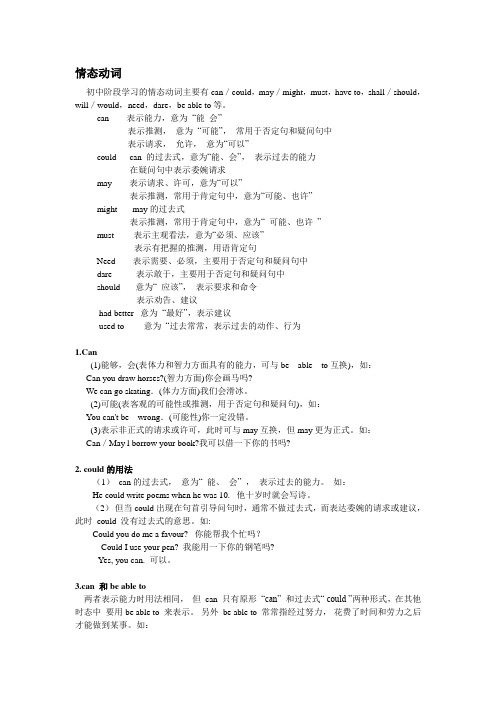
情态动词初中阶段学习的情态动词主要有can/could,may/might,must,have to,shall/should,will/would,need,dare,be able to等。
can 表示能力,意为“能会”表示推测,意为“可能”,常用于否定句和疑问句中表示请求,允许,意为“可以”could can 的过去式,意为“能、会”,表示过去的能力在疑问句中表示委婉请求may 表示请求、许可,意为“可以”表示推测,常用于肯定句中,意为“可能、也许”might may的过去式表示推测,常用于肯定句中,意为“ 可能、也许”must 表示主观看法,意为“必须、应该”表示有把握的推测,用语肯定句Need 表示需要、必须,主要用于否定句和疑问句中dare 表示敢于,主要用于否定句和疑问句中should 意为“ 应该”,表示要求和命令表示劝告、建议had better 意为“最好”,表示建议used to 意为“过去常常,表示过去的动作、行为1.Can(1)能够,会(表体力和智力方面具有的能力,可与be able to互换),如:Can you draw horses?(智力方面)你会画马吗?We can go skating.(体力方面)我们会滑冰。
(2)可能(表客观的可能性或推测,用于否定句和疑问句),如:You can't be wrong.(可能性)你一定没错。
(3)表示非正式的请求或许可,此时可与may互换,但may更为正式。
如:Can/May l borrow your book?我可以借一下你的书吗?2. could的用法(1)can的过去式,意为“ 能、会” ,表示过去的能力。
如:He could write poems when he was 10. 他十岁时就会写诗。
(2)但当could出现在句首引导问句时,通常不做过去式,而表达委婉的请求或建议,此时could 没有过去式的意思。
情态动词(Model Verbs)讲解
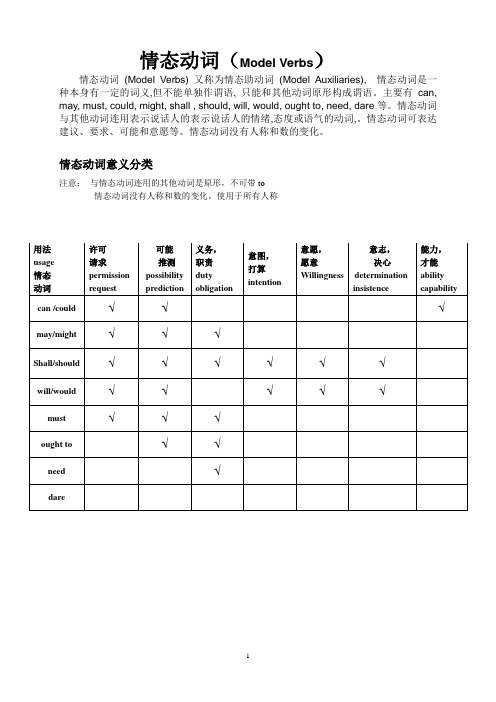
情态动词(Model Verbs)情态动词(Model Verbs) 又称为情态助动词(Model Auxiliaries), 情态动词是一种本身有一定的词义,但不能单独作谓语, 只能和其他动词原形构成谓语。
主要有can, may, must, could, might, shall , should, will, would, ought to, need, dare等。
情态动词与其他动词连用表示说话人的表示说话人的情绪,态度或语气的动词,。
情态动词可表达建议、要求、可能和意愿等。
情态动词没有人称和数的变化。
情态动词意义分类注意:与情态动词连用的其他动词是原形,不可带to情态动词没有人称和数的变化,使用于所有人称一.can 和could 的用法:1.表示:能力ability and capacity 意“能够”表示人或动物的内在能力即有某种知识或者技能而能够做某事。
有时可以和be ableto互换。
He can swim across the river ( He is able to swim across the river)Can she speak English ? ( Is she able to ----)He hurt his foot and couldn't (wasn't able to) play football. 他脚受了伤,所以他不能踢足球了。
can 和be able to 的区别:(1)表示能够时,can只能用在现在时(can)和(could)过去时。
而be able to 可用于各种时态The baby will be able to walk next month 将来时,不能用I hope to be able to see her again 不定式,不用(2)be able to暗指做成了某一事情。
(manage to)Because he worked hard, he was able to pass his examination. 因为他努力工作,所以他能及格。
第9讲情态动词can(班课)
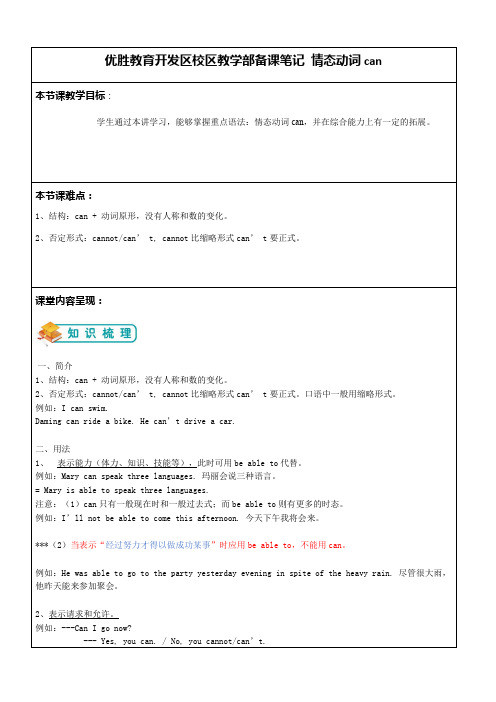
课堂内容呈现:一、简介1、结构:can + 动词原形,没有人称和数的变化。
2、否定形式:cannot/can’ t, cannot比缩略形式can’ t要正式。
口语中一般用缩略形式。
例如:I can swim.Daming can ride a bike. He can’t drive a car.二、用法1、表示能力(体力、知识、技能等),此时可用be able to代替。
例如:Mary can speak three languages. 玛丽会说三种语言。
= Mary is able to speak three languages.注意:(1)can只有一般现在时和一般过去式;而be able to则有更多的时态。
例如:I’ll not be able to come this afternoon. 今天下午我将会来。
***(2)当表示“经过努力才得以做成功某事”时应用be able to,不能用can。
例如:He was able to go to the party yesterday evening in spite of the heavy rain. 尽管很大雨,他昨天能来参加聚会。
2、表示请求和允许。
例如:---Can I go now?--- Yes, you can. / No, you cannot/can’t.此时可与may互换。
在疑问句中还可用could,might(不可用于肯定句、否定句或答语)代替,不是过去式,只是语气更委婉。
例如:--- Could I come to see you tomorrow?--- Yes, you can. ( No, I’m afraid not. )3、表示可能性猜测。
例如:The man over there can´t be my uncle. My uncle has gone to Beijing. 那个人不可能是我的叔叔。
九年级英语情态动词完整归纳

九年级英语情态动词完整归纳一、初中英语情态动词1.—I take the magazine out of the reading room?—I'm sorry you.A. Could; couldn'tB. Must; couldn'tC. Will; can*tD. May; can't【答案】D【解析】【分析】句意:一一我可以把杂志带出阅览室吗?一一对不起,你不能.could 能,可以;must必须:w川将:may可以;can能,可以,can't不可以,不能.此处表示请求许可,用could或者may,由could或者may构成的一般疑问句,肯定答复用yes,主语+can,否认答复用sorry,主语+can't,结合选项,故答案选D“【点评】考查情态动词的辨析.注意理解句意,理解选项,根据语境,选出正确的答案.2.—Life is becoming convenient with the Internet.—That's true! Almost everything be done online.A. mustB. couldC. shouldD. can't【答案】B【解析】【分析】句意:一一生活正随着网络变得方便.一一那是真的.几乎所有的事情可以在网上完成.A 必须,B 可以,C 将,D 不能.Life is becoming convenient with the Internet.生活正随着网络变得方便,可知应该是很多事情可以在网上完成,应选【点评】考查情态动词.注意理解和掌握情态动词的不同用法.3.Look at the sign! It says “No Smoking!〞 You smoke here. It's dangerous.A. mustn'tB. ought not toC. needn'tD. don't have to【答案】A【解析】【分析】句意:看这个标志!上面写道"禁止吸烟!"你不能抽烟.这是危险的.A.mustn't 禁止,不允许;B.ought not to 不应该,不应当;C.needn't 不必;D.don't have to 不必.根据“N.Smoking!〞可知此处禁止吸烟,故答案为A.【点评】考查情态动词.掌握情态动词的意义和用法.4.Teenagers_allowed to drive .A. should not beB. should be notC. not should be【答案】A【解析】【分析】句意:年轻人不应该被允许驾车.Should是情态动词,其否认表达一般在在后面加副词not,应选A.【点评】此题考查含有情态动词的被动语态的否认形式.平时注意记忆情态动词的记忆和用法.5.—Where is Mom now?—I'm not sure. She be in the kitchen.A. shallB. mayC. needD. must【答案】B【解析】【分析】句意:一妈妈现在在哪里?一我不确定,她也许在厨房.A. shall将要:B. may 可以,可能:C. need需要;D. must必须,一定:根据I'm not sure可知是不确定:应选B»【点评】此题考查情态动词表推测的用法.6.—Who it be that is knocking at the door?—It be father, but I'm not sure.A. call; mustB. can; mayC. must; canD. may; must【答案】B【解析】【分析】句意:一一敲门的人可能是谁呢?一一他可能是父亲,但是我不确定. 第一空,can可能,表猜想用语疑问句形式,may是表可能;第二空,根据后面的but I'm not sure,可知表示不确定的猜想,应填may,应选B.【点评】此题考查情态动词辨析.先弄清每个情态动词的使用规那么.根据上下文的联系确定情态动词的使用.7.— I wonder if this smart phone is Mary's.— It belong to her. is totally different from this one.A. mustn't; HerB. can't; Her c. can't; Hers D. may; Hers 【答案】c【解析】【分析】句意:一一我想知道这个智能机是否是玛丽的.一一不可能属于她,她的和这个完全不同.情态动词表示推测时,用must表示"一定〞,用might, could表示“可能〞,用can't 表示"不可能".从句意看,这与她的完全不同,故不可能是她的,前面用can't o形容词性的物主代词后一定有一个被修饰的名词,名词性的物主代词后没有被其修饰的词,此题后没有被修饰的词,用名词性的物主代词,“她的":hers.应选C.8.As middle school students, we _follow the public rules wherever we go.A. wouldB. shouldC. mightD. could【答案】B【解析】【分析】句意:作为中学生,无论走到哪里我们应该遵守公共规章制度.would 将会,指将会发生的事情:should,应该,主要用于告诉某人应该做什么、给予忠告或加强语气.might,可能,事情发生的可能性:could,能,表示委婉语气;此处表示应该做的事情,应选B.【点评】此题考查情态动词辨析.根据上下文的联系确定所使用的情态动词.9.—He be in the classroomj think.—No, he be in the classroom. I saw him go home a minute ago.A. can; may notB. must; may notC. may; mustn'tD. may: can't【答案】D【解析】【分析】句意:一一我认为他可能在教室里.一一不,他肯定没有在教室里,我刚才看到他回家了.must,can (could) ,may (might)可以表示猜想,must表示肯定猜想,用于肯定句,肯定……一定……:can't表示否认猜想,肯定不......................... 另外can ( could ) ,may (might),表示可能性猜想,可能......根据I think,可知把握较小,根据I saw him go home a minute ago.可知第二句把握大,应选D.10.Shall we meet at the station at 7 am?---- In fact, we. The train until 9 a. m.A. mustn't; doesn't leaveB. mustn't; leavesC. needn't; won't leaveD. needn't; will leave【答案】C【解析】【分析】need,需要,否认式是needn't: must的含义是必须一定,其否认形式mustn't 表示禁止的含义.句意:我们上午七点在车站见而好吗?一一实际上,我们不必. 火车到上午九点钟才出发.结合语境可知后一空描述的是将要发生的动作,故用一般将来时态.选C.【点评】情态动词的考查是初中英语考查的重点,平时学习中一定要熟记这些词的根本词义及用法上的不同,注意其用法及在句子中表达语气的不同.测试中结合语境选择适宜答案.11.—you play tennis?—Yes, and I'm a good player.A. CanB. MayC. MustD. Should【答案】A【解析】【分析】句意:一一你会打网球吗?一一会,我是一名优秀的网球员.Can能,表示水平;may可以,表示允许;must必须,表示要求:should应该,表示建议;结合句意,此处表示水平,故用情态动词can,应选A.【点评】此题考查情态动词的用法.12.—Wow....another gift! What's in the box?—I'm not sure. It be a pair of sports shoes.A. mustB. mayC. will【答案】B【解析】【分析】句意:一一哇哦,另一个礼物!在盒子里面的是什么?一一我不确定, 它可能是一双运动鞋.A. must必须;B. may可能,表示没有把握的肯定推测:C. will将会.根据答语中的不确定可知这里应为可能,故答案为B.【点评】考查情态动词.掌握情态动词may表示推测的用法.13.—I think we need to sit down and have a talk. —I _________ agree more. Let*s take the bench over there.A. couldB. couldn'tC. shouldD. shouldn't【答案】B【解析】【分析】试题分析:句意:一一我认为我们需要坐下来谈一谈.一一我完全同意.我们到那边凳子上坐© I could agree more我可以同意更多的,I couldrVt agree我不同意I couldn't agree more,我完全同意I should agree more.应该同意更多,I shouldrVt agree more 我不应该同意更多.后句Let's take the bench over there.我们在那边的凳子上坐吧〕可以推测出,我同意,应选B'j14.You are supposed to bow when you meet someone from Korea.A. mustB. shouldC. wouldD. can【答案】B【解析】【分析】句意:当你遇到来自韩国的人时,你应该鞠躬.A. must必须,强调主观上的愿望;B. should应该,表示责任与义务:C. would要,将要:D. can能,会,表示能力.Be supposed to 表示"应该",应选B.【点评】此题考查情态动词词义辨析,以及must、should, would、can四个情态动词的词义和用法.15.Size and type do not matter — you do almost anything if you never give up.A. shouldB. mustC. needD. can【答案】D【解析】【分析】句意:大小和类型不重要一一如果你不放弃,你几乎可以做任何事.A. should 应该:B. must 必须;C. need 需要;D. can 可以,能:根据if you never give up,可知此处说你能做几乎任何事情,应选D.【点评】此题考查情态动词辨析.根据上下文的联系确定所使用的情态动词.16.—Some people don*t show their talents at the very beginning.—I agree. Even Einstein read until he was seven.A. can'tB. mustn'tC. couldn'tD. needn't【答案】c【解析】【分析】句意:一一一些人在一开始的时候没有表现处自己的才能.一一我同意.甚至爱迪生直到七岁时才会读书G can't不能:mustn^ 一定不会,禁止:couldn't不能:needn'to not...until...,直至U 才根据Some people don't show their talents at the very beginning.可知此处指爱迪生7岁才会读书,指才能,能做某事,根据he was seven ,可知句子时态是过去时,应选C. 【点评】此题考查情态动词辨析.根据上下文的联系确定句中所使用的情态动词.17.Harry's been driving all day --------he be tired.A. needB. canC. shallD. must【答案】D【解析】【分析】句意:哈利已经开了一整天车了一一他一定累了.根据句意可知,开了一整天车,所以推测他累是一定的.所以用情态动词must.应选D,18.—Kate, it's midnight! Why stay up so late?—I'd like to go to bed earlier, but the test paper ____ be handed in tomorrow morning.A. mayB. shouldC. canD. must【答案】D【解析】【分析】句意:Kate,都半夜了,你为什么熬夜到这么晚?我想要早一点睡觉, 但是这个试卷明天早上必须交上.may〞可以";should"应该":can"能,会,可能〞;must〞必须“.根据句意Kate熬夜到很晚,说明试卷明天必须交上,语气非常强,故应选D.【点评】考查情态动词辨析,区分may, should, can, must的含义和用法.19.—Is that boy Scott?—No, it _ be Scott. Scott is much taller.A. canB. can'tC. mustn't【答案】B【解析】【分析】句意:一一那个男孩是Scott吗?一一不,他不可能是Scott.. Scott个字高很多.A可能、可以:B不可能:C禁止.根据题干中Scott is much taller.可知斯科特更高,所以那个男孩不可能是斯科特,如表示对现在情况的否认推测,应用can"动词原形,故答案选B.【点评】考查情态动词,注意平时识记其用法,理解句意.20.The girl in the classroom be Mary. She called me from Beijing just now.A. mustn'tB. needn'tC. shouldn'tD. can't【答案】D【解析】【分析】句意:教室里的女孩不可能是玛丽.她刚刚从北京给我打的.A.不准,不允许,禁止;B.不必;C.不应该;D.不可能.后句句意可以堆测出玛丽不在教室,表示否定的推测,不可能,应选D.21.— Is that Mr. Green?—Impossible. He has gone to America. It_be him.A. couldB. mustC. can'tD. might【答案】c【解析】【分析】句意:一一那是格林先生吗?一一不可能,他去美国了.不可能是他. A.could可能,表示对目前情况作的可能的推测;可以,表示委婉的语气:B. must必须, 强调主观的愿望;一定,表示对目前作的肯定推测:C. can't不能,表示水平:不可能,表示否认的推测;D. might可能,表示可能的推测.根据句意,他去美国了,所以那不可能是格林先生.应选C.22.— What's the matter with Tom? He's been absent for two days.—Oh! He be ill. Let*s go and see him.A. needB. mightC. mustD. should【答案】c【解析】【分析】句意:一一汤姆怎么了?他已经缺席两天了.一一哦!他可能病了.我们去看看他吧.need需要,指有必要:might可能,表示推测语气,可能性很小:must 一定,表肯定推测:should应该,表建议.根据Let's go and see him.,可知推测汤姆生病了,去看看汤姆,表示肯定的推测,用must,应选C.【点评】考查情态动词辨析.根据上下文的联系确定所使用的情态动词.23.I'm sorry I_go now. My piano lesson will start in ten minutes.A. mustB. mightC. canD. could【答案】A【解析】【分析】句意:对不起,我得走:了.我的钢琴课十分钟后开始.A必须,表示责任:B可以,表示建议;C能够,表示水平或许可:D能够,表示许可.根据题干中的My piano lesson will start in ten minutes.提示可知,此句表示必须走了,应选A.【点评】考查情态动词的辨析.弄清每个情态动词的根本含义及用法,根据上下文语境确定正确的答案.24.—Must I go out to have dinner with you, Mum?—No, you ___ , my dear. You're free to make your own decision.A. shouldn'tB. mustn'tC. needn'tD. can't【答案】C【解析】【分析】句意:一一妈妈,我必须跟你出去吃饭吗?一一不,你不必,亲爱的. 你可以自由作出你的决定.问句是must构成的一般疑问句,根据no,可知是否认答复, must的否认回容许会使用needn'3故答案是C.【点评】考查情态动词neednl的用法,注意must构成的一般疑问句的否认答复.25.Please don't make so much noise. I hear the speaker very well.【答案】B【解析】【分析】句意:请不要发出那么多噪音.我不能很好地听清楚发言者的话. needn't 不必;cant 不能;shouldn't 不应该;mustn't 禁止.根据前半句的Please don't make so much noise.可知别人发出了太多噪音,所以他无法听见演讲者的话,故用情态动词 can'te 应选 Bo【点评】考查情态动词,结合句意和词义做出判断.26. Mr. Zhang has gone to Mexico, so the man be him.A. mustB. mightC. can't【答案】c【解析】【分析】句意:张先生去了墨西哥,所以那个男人不可能是他.A : must 一定, 表示推测:B : might 可能;C : can't 不可能,推测的否认.根据上文Mr. Zhang has gone to Mexico 可知那个男人不可能是他.表示否认的推测,要用cant,应选C .【点评】考查情态动词的辨析.根据语境选择正确的情态动词. 27. According to the law, traffic keep to the left in England.A. mayB. mustC. needD. can【答案】B【解析】【分析】句意:根据法律规定,在英国车辆必须靠左形式.A.may 可以,表示允 许:B.must 必须,表示要求:Cneed 需要,表示必要性:D.can 能,表示水平.根据 According to the law,可知法律的要求,应是必须的,应用must,故答案为B .【点评】考查情态动词.掌握情态动词的常用法. 28. —Look, Jim is talking to his friend under the tree.—It be him. He has back to Canada.A. can't; goneB. can't; beenC. may not; beenD. mustn't; gone【答案】A【解析】【分析】考查情态动词表推测及现在完成时的用法.一方面,表示推测语气时, carft 意为"不可能";may not 意为"可能不是";must 不用于否认句:另一方面,"have/has gone to+地点〞意为"去了某地",表示不在说话人这儿:"have/has been to +地点〞表示"去过 某地".句意为"一一看,吉姆和他朋友在树下谈话.一一不可能是他.他己经回加拿大 了「应选A . 29. If you the book, you buy it right now, I think.【答案】c A. needn't; needn'tC. don't need; needn't B. don't need; don*t needD. don't need; needn't to【解析】【分析】句意:如果你不需要这本书,我觉得现在你就没有必要买它.needn't是情态动词need的否认形式,后而跟动词原形:don't need是实意动词need的否认形式, 后面跟to do sth,或者名词做宾语,根据句意可知应选Co30.—Sic you use your mobile phone at the gas station. It's very dangerous.—Sorry, I will put it out soon.A. mustn'tB. don't have toC. needn'tD. may not【答案】A【解析】【分析】句意:一一先生,你不能在加油站用,太危险了.一一对不起,我很快就会把它挂掉.A禁止,B不必,C不必,D可能不,根据It's very dangerous,可知是禁止,应选A.【点评】考查情态动词,注意根据ItK very dangerous的语境选择用法.31.—Hi, madam. Can I take the story books out?-No, my boy. They be taken out of the reading-room. It's a rule.A. mustn'tB. needn'tC. couldn'tD. wouldn't【答案】A【解析】【分析】句意:一嗨,夫人,我能把这些故事书拿出去吗?一不,孩子,他们不可以被带出阅览室,这是制度.A. mustn*t不可以,禁止:B. needn't不必;C. couldnt不可能:D. wouldn't将不会.根据心a rule,可知这是制度,所以你不可以把这些书带出去, mustn't不可以,禁止,故答案选A,【点评】考查情态动词,表示禁止应使用mustn332.— Shall I book some seats for the concert?—・ I've done that.A. Yes, you mayB. No, you mustn'tC. No, you needn*tD. No, you can't【答案】c【解析】【分析】Yes, you may是的,你可以:No, you mustn't不,你千万不要:No, you needn't不,你不必:No, you can't不,你不能.句意:我要预定一些音乐会的座位吗?根据下文,我已经办了.可知选C最符合语境.【点评】考查交际用语33.He work on the farm every day. I'm sure about that because his skin is very black.A. can'tB. mayC. mustD. couldn't【答案】c【解析】【分析】句意:他一定每天在农场工作,我敢肯定,由于他的皮肤很黑.A. can't 不可能,对事情表示否认推测;B.may可以,可能:C.must一定、必须,表示非常肯定的推测:D. couldn't 不能.根据I'm sure about that because his skin is very black,可知他是在农场上工作,此处表示肯定的推测,应选C.【点评】此题考查情态动词.要掌握每个情态动词的使用方法.34.—Must I practice the violin right now?—No, you・ You do it later on.A. mustn't; mayB. shouldn't; mightC. needn*t; mayD. needn't; must【答案】c【解析】【分析】句意:一我必须马上练习钢琴吗?一不,你不必.你可以等会儿练. mustn't:不准,不允许,禁止:shouldn't不应该:needn't不必:前句问"必须吗?"答复:不必:needn't;后句话“你可以等会儿练",是表示许可的,may可以:must必须;might 可以.might为may的过去式,此处用现在,应选C.【点评】此题考查情态动词的词义辨析.以及must、need、should、need、might、may几个词的词义和用法35.—Look! The man welcoming us at the school gate be our headmaster.- No, it ____ b e him. He is having a meeting in the office now.A. must; can'tB. must; mustn'tC. can't; mustn'tD. mustn't; can 【答案】A【解析】【分析】句意:一一看,在学校门口欢送我们的一定是我们的班主任.一一不, 不可能是他.现在他正在办公室开会.must一定,表示肯定推测;carVt不可能,表示否认推测:mustn't 禁止,不表示推测:can 可能.根据He is having a meeting in the office now. 可知班主任正在开会,所以不可能是班主任,所以第二个空用can匕根据no可知第一个人认为正在欢送我们的一定是班主任,所以用must,应选A.【点评】考查情态动词,注意平时识记,理解句意.。
英语语法:情态动词

英语语法:情态动词情态动词(Modal verbs)本身有一定的词义,表示语气的单词。
但是不能独立作谓语,只能和动词原形一起构成谓语。
情态动词用在行为动词前,表示说话人对这一动作或状态的看法或主观设想。
小编在这里整理了相关知识,快来学习学习吧!英语语法:情态动词一、can和could1、can的用法(1)表示体力和脑力方面的能力。
(2)表示对现在的动作或状态进行主观的猜测,主要用在否定句和疑问句中。
(3)表示可能性,理论上的可能性,意为“有时候可能会”,可用于肯定句。
(4)表示允许,意思与may接近。
(5)表示说话人的推测、怀疑、惊异、猜测或不肯定等,主要用于否定句、疑问句或感叹句中。
(6)can的特殊句型cannot…too / enough表示“无论怎么。
也不过分”。
“越。
越好”。
cannot but+ do sth.表示“不得不,只好”。
2、could的用法(1)表示能力,指的是过去时间。
(2)表示允许,指的是过去时间。
(3)表示可能,可以指过去时间,也可以指现在时间,表示语气缓和。
(4)委婉客气地提出问题或陈述看法,指的是现在时间。
主要用于疑问句,回答时用can。
3、can与could的区别can表推测时只用于否定句和疑问句(could无此限制)。
couldn’t的可能性比can’t小。
4、can与be able to的区别(1)现在时:无区别,但后者不常用。
(2)完成时;can没有完成时,此时要用have(has,had)been able to。
(3)将来时:can没有将来时,要用will be able to。
(4)过去时:could表示一般能力,was/were able to 表示在具体场合通过努力成功做成某事的能力。
二、may 和might1、may的用法(1)表示询问或说明一件事可不可以做。
(2)表示一件事或许会发生或某种情况可能会存在,通常用在肯定句和否定句中。
注意:表示可能性时,can’t语气强,表示“不可能”,may not语气弱,表示“可能不”。
九年级英语情态动词用法

情态动词用法I.情态助动词的特征1)除ought和used以外,其他情态动词后面只能动词原形。
We used to grow beautiful roses.I asked if he would e and repair my television set.2)情态助动词用于第三人称单数现在时的时候,没有词形变化,即其词尾无-s形式:She dare not say what she thinks.II.情态助动词的意义和用法1)can和could的用法1.表示能力或客观可能性,还可以表示请求和允许。
如:Can you finish this work tonight?Man cannot live without air.—Can I go now? — Yes, you can.注意:①could也可表示请求,预期委婉,主要用于疑问句,不可用于肯定句,答语应用can(即could不能用于现在时态的简略答语中)。
如:Could I e to see you tomorrow?Yes, you can. (否定答语可用No, I’m afraid not.)②can表示能力时,还可用be able to代替。
如:I’ll not be able to e this afternoon.2.表示惊异、怀疑、不相信的态度。
(主要用在否定句、疑问句或惊叹句中)Can this be true?How can you be so careless!This cannot be done by him.3.“can(could) + have + 过去分词”的疑问或否定形式表示对过去发生的行为怀疑或不肯定。
如:He cannothave been to that town.Can he have got the book?2) may和might的用法1.表示许可。
表示请求、允许时,might比may的语气更委婉一些,否定回答时要用mustn’t表示“不可以”、“禁止”、“阻止”之意。
9 情态动词

4
3.Must +have done 表示对过去发生的事情作出的肯定 判断 他们在玩篮球, 他们一定完成了作业。
They are playing basketball, they must have finished their homework. 路是湿的。昨天晚上一定下雨了。
The road is wet. It must have rained last night.
21
may 1. I don't know where she is, she _______ be in Wuhan. must be marking 2. At this moment, our teacher ________________
our exam papers.
这时,我们老师想必在批改试卷。
14
Shall/should
1.shall 用于第二、三人称陈述句中,表示说话人给对方的命令, 警告,允诺或威胁。 1)You shall go with me.(命令) 2)You shall have the book when I finish it.(允诺) 3)He shall be punished.(威胁) 2. shall用于第一、三人称疑问句中,表示说话人征求对方的意 见和向对方请示。 4)Shall we begin our class?(征求意见) 5)When shall Mike be able to leave hospital?(请示) 3.用于条约,规定,规章等文件中,表示一种义务,多用于第三 人称中。 6) “The interest ___be divided into five parts, according to the agreement made by both sides.” declared the judge. A. may B. should C. must √ shall D.
- 1、下载文档前请自行甄别文档内容的完整性,平台不提供额外的编辑、内容补充、找答案等附加服务。
- 2、"仅部分预览"的文档,不可在线预览部分如存在完整性等问题,可反馈申请退款(可完整预览的文档不适用该条件!)。
- 3、如文档侵犯您的权益,请联系客服反馈,我们会尽快为您处理(人工客服工作时间:9:00-18:30)。
语法系列——情态动词
一.can和could
(1)could用来表示请求时,语气委婉,主要用于疑问句,不能用于肯定句,答语应用can(即:could 不能用于现在时态的简略答语中)。
如:
——Could I use your dictionary?
——Yes, you can.(否定回答可用:No, I’m afraid not.)
(2)can和be able to辨析
can(could)和be able to都可以表示能力,意思上没有区别。
但can只有现在式和过去式,而be able to 则有更多的形式。
如:
I’ve always wanted to able to speak fluent English.
Those bags look really heavy, are you sure you’ll be able to carry them on your own?
表示在过去某时的某一场合经过一番努力,终于做成了某事,通常不用could,而用was/were able to 来表示。
这时,was/were able to相当于managed to do或succeed in doing。
如:
After the accident it was a long time before she was able to walk again.
The fire was very big, but most people were able to escape from the building.
(3) 惯用形式“cannot …too/ enough…”表示“无论怎么……也不(过分)”。
如:
You cannot be too careful.你越小心越好。
惯用形式“cannot but+ 不定式(不带to)”表示“不得不,只好”。
如:
I cannot but admire her determination.我不得不钦佩你的决心。
二.may和might
二.must和have to
四.shall和should
五.will和would
特别说明:would与used to辨析
would可用来表示过去反复出现的动作,但不能表示过去存在的状态,所以我们不能说:“she would be a quiet girl.”
另外,would强调过去某种特定情况下的活动,是完全过去的事情,同现在没有联系。
而used to则着眼于过去和现在的对比,隐含现在已不存在,动作或状态都可表示。
Would可以表示不规则的习惯,used to则不可。
如:
He used to be a naughty boy and cause trouble.
I used to get up at six in the morning.
Sometimes she would take a walk in the neighboring woods.
In those days, whenever I had difficulties, I would go to Mr. Chen for help.
六.need和dare
七.ought的用法:
说明:should与ought to 表示“应该”时的区别
should 表示自己的主观看法,而ought to的语气中,含有“按道理应该……”之意。
若要反映客观情况或涉及法律义务和规定,一般用ought to。
如:
You should help them with their work.
You are his father. You ought to get him to receive good education.
八.“情态动词+have done”用法。
